Whether you’re pushing a grocery cart or putting on shoes, you use your best core exercises to accomplish a lot of everyday activities. It also affects your balance, posture, and stability.
Contrary to popular belief, your core doesn’t just include your abdominal muscles. It also consists of muscles in your back and around your pelvis.
Your core, or trunk, includes your:
- Erector spinae. The erector spinae is a back muscle that extends up your trunk. It helps you stand up straight after bending over, as well as bend sideways and rotate your head.
- Rectus abdominis. When you bend forward, you use an abdominal muscle called the rectus abdominis. It’s sometimes called the “six pack” muscle.
- Obliques. Your internal oblique and external oblique help you rotate or bend your trunk.
- Transverse abdominis. The transverse abdominis, which wraps around the front and side of your trunk, stabilizes your pelvis.
- Multifidus. The multifidus in your back supports your spine.
Other muscles that make up your core include your:
- pelvic floor
- diaphragm
- glutes
- muscles that attach to the pelvis (hamstrings, hip flexors, and hip adductors)
Keeping these muscles strong helps stabilize your body, support your spine, and enhance your overall fitness.
Read on for the best core-strengthening moves for every fitness level.
Beginner moves
If you’re new to exercise or if you haven’t exercised in a long time, start with these beginner moves.
It may also be a good idea to consult with a personal trainer, if you can, to talk about the right amount of reps and sets for your personal fitness level and goals.
Throughout these best core exercises, you’ll see the phrase “tighten your core” — but how do you know if you’re actually doing that?
One good way to start is to inhale, and as you’re doing that, imagine you’re bringing your belly button toward your spine. Hold your muscles tight in that position for a few seconds.
This feeling of braced stomach muscles is what it feels like to engage — or tighten — your core.
Bridge – best core exercises
This pose activates your glutes to lift your hips, which helps train your core while toning your butt and thighs.

- Start on your back. Bend your knees and plant your feet on the floor at hip width. Place your hands at your sides, palms down.
- Tighten your core and glutes.
- Raise your hips until your knees are in line with your shoulders.
- Hold for 10–30 seconds.
- Repeat 3–5 times.
Crunch – best core exercises
Crunches are a classic core-strengthening move. The act of lifting your upper body works your abdominal muscles.
If you have occasional low back pain, do crunches with care — move slowly and start with just a few reps.
If your low back pain is chronic, talk with a certified trainer or healthcare professional before attempting this classic crunch. It may not be the best option for you.
- Start on your back. Bend your knees and plant your feet on the floor at hip width. Line up your head and spine. Cross your arms across your chest.
- Tighten your core and relax your neck and shoulders. Tuck in your chin and lift your upper back, keeping your lower back, pelvis, and feet on the floor. Pause.
- Slowly lower your upper back to return to the starting position.
- Start with 1 set of 8–12 reps.

Supine toe tap
This is a basic Pilates exercise. It engages your core muscles while working your glutes, hips, and legs.
Toe taps also place minimal pressure on your spine. If you have back pain, toe taps may be an ideal alternative to crunches.

- Start on your back. Lift your legs, with your knees bent to 90 degrees. Place your hands at your sides, palms down.
- Tighten your core. Lower your right foot and gently tap the floor, keeping your left leg still and your back flat.
- Raise your right leg to return to the starting position.
- Repeat with your left leg.
- Start with 1 set of 8–12 reps.
Bird Dog – best core exercises
The bird dog engages both your abdominal and back muscles, so it’s an ideal core-strengthening move. It also challenges your coordination, balance, and stability.
- Start on all fours, hands below your shoulders and knees below your hips.
- Tighten your core. Lift and straighten your right leg to hip level. Simultaneously lift and extend your left arm to shoulder level, palm down. Hold a neutral spine without allowing your back to arch as you extend your arm and leg.
- Pause.
- Repeat with your left leg and right arm.
- Start with 1 set of 8–12 reps.

Bicycle crunch
This variation on a regular crunch works your obliques, rectus abdominous, and hips.
Start with your back on the floor, with your left knee bent and drawn toward your chest. Keep your right leg straight and slightly lifted off the floor. Place your hands behind your neck or the lower part of your head — be careful not to pull on your neck while you do this move.

- With your left knee bent and your right leg straight, lift your right shoulder off the floor and move your right elbow toward your left knee.
- As you bring your right shoulder back to the floor, extend your left leg while bending your right knee and bringing it toward your chest.
- As your right knee moves farther in, lift your left shoulder off the floor and move your left elbow toward your right knee.
- Start with 3 sets of 12 alternate repetitions.
Intermediate moves
As you get stronger, take it up a notch with these intermediate best core exercises.
Plank – best core exercises
The plank is a full-body exercise that targets your core. It also strengthens your arms, shoulders, back, glutes, and legs.
- Start on all fours, with your hands below your shoulders and your knees below your hips.
- Straighten your legs behind you, keeping your feet hip-width apart. Tighten your core.
- Hold for 10–30 seconds.
- Repeat 3–5 times.
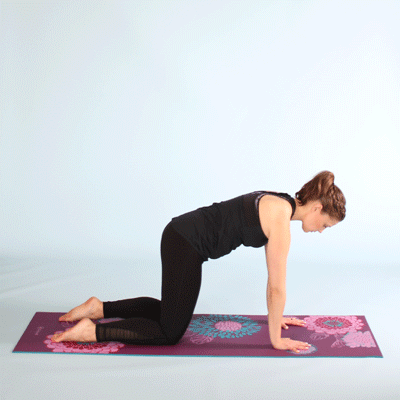
To make this exercise easier, keep your knees on the floor, with your weight over your hands. Keep a straight line from your knees to shoulders.
Warrior crunch
This crunch variation works your core and lower body, including your thighs, glutes, and quads.

- Stand with your feet slightly wider than shoulder width and your toes turned outward. Put your hands behind your head and open your chest.
- Tighten your core and glutes. Bend your knees until your thighs are parallel to the floor.
- Bend your torso to the side, moving your right elbow toward your right thigh. Repeat on the left side.
- Start with 1 set of 8–12 reps.
Bird dog with elbow to knee
This variation on the basic bird dog incorporates fluid movement to engage your abs and back while improving core mobility.
- Start on all fours, hands below your shoulders and knees below your hips.
- Tighten your core. Lift and straighten your right leg to hip level. Simultaneously lift and extend your left arm to shoulder level, palm down.
- Bring your right knee and left elbow toward each other. Return to the starting position.
- Start with 1 set of 8–12 reps.
- Repeat on the other side.
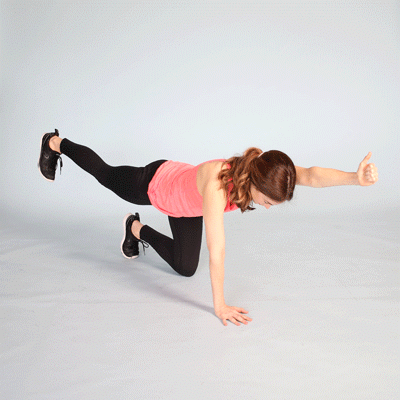
Advanced moves
Once you’ve mastered intermediate moves, challenge yourself to an advanced core routine. These best core exercises will further build core strength by engaging your muscles in more complex ways.
Mountain climber
This intermediate exercise combines a plank with knee movements, so it’s an excellent move for balance and core strength.
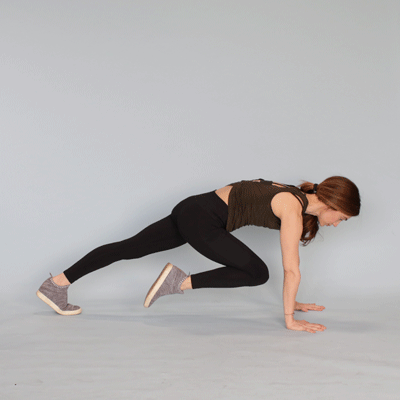
- Start in a plank with your hands below your shoulders. Tighten your core.
- Lift your right knee toward your chest, keeping your back straight and hips down.
- Return your right leg to the starting position as you simultaneously lift your left knee toward your chest.
- Continue alternating legs. Start with 1 set of 8–12 reps.
Side plank with rotation
This best core exercise is an advanced version of the basic plank. It strengthens your arms, shoulders, and obliques by combining a side plank with arm movements.
- Lie on your right side with your right forearm below your shoulder. Extend your legs, left foot on top of the right. Tighten your core.
- Lift your hips to form a straight line with your body. Raise your left arm straight up.
- Rotate your torso toward the floor and bring your left arm under your body.
- Rotate your torso again to straighten your left arm to return to the starting position.
- Start with 1 set of 8–12 reps.
- Repeat on the other side.
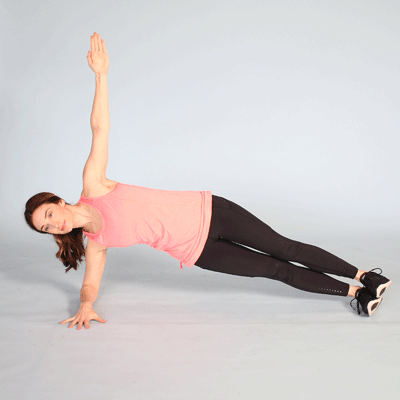
Turkish get-up
This full-body movement is a great way to increase spinal stabilization, as well as improve mobility in your hips, lumbar spine, and thoracic spine. It’s also great for increasing strength in the ab muscles around your spine, as well as your shoulders.
Try this movement once or twice without a weight, and then start with something light (think 5 pounds) to make sure your shoulders are stable enough to handle weight overhead. Use a heavier weight as you build strength.
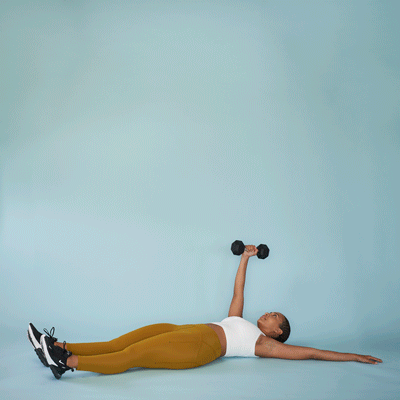
- Lie on your back with your legs straight out and arms at your sides at about a 45-degree angle.
- Bend your right leg and place your right foot on the floor, a few inches from your butt.
- Bring your right arm straight up toward the ceiling, making a fist with your right hand and keeping your knuckles pointing toward the ceiling (this helps with shoulder stabilization).
- Focus your gaze on your fist — this is where the weight will eventually be. You want to keep your fist directly above your shoulder throughout the entire move.
- Next, push through your right heel and your left elbow to prop yourself up onto your left elbow, making sure your chest is facing out in front of you, not up toward the sky.
- Then, push your left palm into the floor and pull your body into a seated position, allowing your abs to do most of the work.
- Next, slide your left leg underneath you, making sure your left knee and left ankle are in line with your left hand.
- Move into a kneeling position with your left knee and right foot on the ground, removing your left hand from the floor as you do so.
- As you continue to hold your right arm overhead, press your right foot into the ground and bring your left leg forward — like you’re doing a lunge. You should now be standing!
- Now, do the movements in reverse until your back is on the ground again.
- Start with 3–5 reps.
The bottom line
Whether you’re looking to kick-start a regular best core exercises routine or add an extra push to your existing one, core-strengthening moves are a great starting place.
Talk with your healthcare professional before starting a new exercise routine. If you have a past or current back injury, consult a certified personal trainer, if you can They can show you how to safely tone and train your core.


